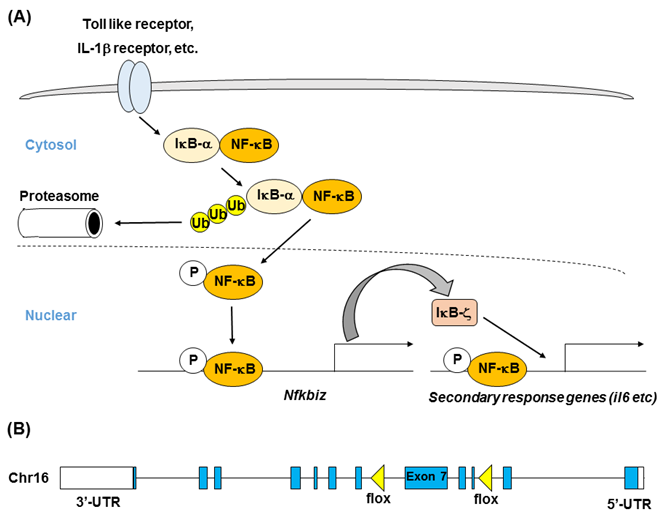 |
April 2017 Mouse of the Month |
Regulatory function of nuclear protein IκB-ζ in inflammatory responses
B6.Cg-Nfkbiz<tm1.1Muta> (RBRC06410)Courtesy of Takashi Maruyama, Ph.D. |
|
IκB-ζ is one of the members of nuclear IκB family, which are characterized by the presence of ankyrin repeats. IκB-ζ interacts with NF-κB and regulates its activation to enhance expression of secondary response genes encoding inflammatory mediators such as IL-6 (A). Mice lacking IκB-ζ develop Sjögren’s syndrome (SS)-like dacryoadenitis, conjunctivitis, and periocular dermatitis [1, 2]. Muta, Maruyama, and their colleagues generated conditional Nfkbiz knockout mice in a C57BL/6 background, in which exons 5-7 of the gene were flanked by loxP sites (B). It has reported that exon 7 including transcriptional activation domain, and it plays a crucial role for transcription [3]. Similar inflammatory phenotype was observed in Nfkbiz floxed mice crossed with epithelial cell-specific Cre mice, but not in the hematopoietic cell-specific IκB-ζ knockout mice. Enhanced apoptosis in the epithelial cells was proven to be the cause of the SS-like phenotype [4]. The group also generated T cell-specific IκB-ζ knockout mice and revealed that TGF-β stimulation to naïve CD4+ T cells induced IκB-ζ expression, which resulted in decreased Ifng gene expression, and that IκB-ζ-deficient Tregs have a reduced immunoregulatory function. IκB-ζ is also critical for activation of natural killer cells, and Toll-like receptor-mediated class switch recombination in B cells [5-7]. Conditional knockout mice provide an opportunity to identify and characterize multiple functions of IκB-ζ. |
| Depositor | : | Takashi Maruyama, Ph.D. Graduate School of Medicine Gifu University |
|
| Strain name | : | B6.Cg-Nfkbiz<tm1.1Muta> | |
| RBRC No. | : | RBRC06410 | |
| References | : | [1] | Kitamura H, Kanehira K, Okita K, Morimatsu M, Saito M. MAIL, a novel nuclear I kappa B protein that potentiates LPS-induced IL-6 production. FEBS Lett.; 485(1):53-6, 2000. |
| [2] | Yamamoto M, Yamazaki S, Uematsu S, Sato S, Hemmi H, Hoshino K, Kaisho T, Kuwata H, Takeuchi O, Takeshige K, Saitoh T, Yamaoka S, Yamamoto N, Yamamoto S, Muta T, Takeda K, Akira S. Regulation of Toll/IL-1-receptor-mediated gene expression by the inducible nuclear protein IkappaBzeta. Nature; 430(6996):218-22, 2004. | ||
| [3] | Motoyama M, Yamasaki S, Eto-Kimura A, Takeshige K, Muta T. Positive and negative regulation of nuclear factor-kappaB-mediated transcription by IkappaB-zeta, an inducible nuclear protein. J Biol Chem. ; 280(9):7444-51, 2005. | ||
| [4] | Okuma A, Hoshino K, Ohba T, Fukushi S, Aiba S, Akira S, Ono M, Kaisho T, Muta T. Enhanced apoptosis by disruption of the STAT3-IκB-ζ signaling pathway in epithelial cells induces Sjögren’s syndrome-like autoimmune disease. Immunity; 38(3):450-60, 2013. | ||
| [5] | MaruYama T, Kobayashi S, Ogasawara K, Yoshimura A, Chen W, Muta T. Control of IFN-γ production and regulatory function by the inducible nuclear protein IκB-ζ in T cells. J Leukoc Biol.; 98(3):385-93, 2015. | ||
| [6] | Miyake T, Satoh T, Kato H, Matsushita K, Kumagai Y, Vandenbon A, Tani T, Muta T, Akira S, Takeuchi O. IκBζ is essential for natural killer cell activation in response to IL-12 and IL-18. Proc Natl Acad Sci U S A.; 107(41):17680-5, 2010. | ||
| [7] | Hanihara-Tatsuzawa F, Miura H, Kobayashi S, Isagawa T, Okuma A, Manabe I, MaruYama T. Control of Toll-like receptor-mediated T cell-independent type 1 antibody responses by the inducible nuclear protein IκB-ζ. J Biol Chem.; 289(45):30925-36, 2014. | ||
| April 2017 Contact: Shinya Ayabe, Ph.D. Experimental Animal Division, RIKEN BioResource Center All materials contained on this site may not be reproduced, distributed, displayed, published or broadcast without the prior permission of the owner of that content. |





